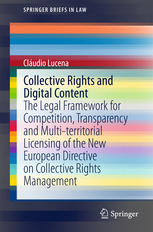

Most ebook files are in PDF format, so you can easily read them using various software such as Foxit Reader or directly on the Google Chrome browser.
Some ebook files are released by publishers in other formats such as .awz, .mobi, .epub, .fb2, etc. You may need to install specific software to read these formats on mobile/PC, such as Calibre.
Please read the tutorial at this link: https://ebookbell.com/faq
We offer FREE conversion to the popular formats you request; however, this may take some time. Therefore, right after payment, please email us, and we will try to provide the service as quickly as possible.
For some exceptional file formats or broken links (if any), please refrain from opening any disputes. Instead, email us first, and we will try to assist within a maximum of 6 hours.
EbookBell Team

4.4
52 reviewsThis book starts with an exercise, proposing a theoretical reflection on the technological path that, over time, has transformed the ways we produce, consume and manage intellectual content subject to copyright protection. This lays the groundwork for a further analysis of the main legal aspects of the new European Directive, its improvements, its tendencies and its points of controversy, with special and more concrete attention to how it proposes to address the issues of competition, transparency and multi-territorial licensing.
Digital technologies, networks and communication have boosted the production and distribution of intellectual content. These activities are based on a renewable and infinite resource – creativity – which turns this content into strategic artistic, cultural, social, economic and informational assets. Managing the rights and obligations that emerge in this system has never been an easy task; managing them collectively, which is more often than not the case, adds even more complexity.
The European Directive on collective management of copyright and related rights and multi-territorial licensing of rights in musical works for online use in the internal market is a policy initiative that seeks to establish an adequate legal framework for the collective management of authors’ rights in a digital environment, recognizing this goal as crucial to achieving a fully integrated Single Market. Part of the Digital Agenda for Europe, it is an effort to promote simplification and to enhance the efficiency of collective rights management by tackling three of the main issues that are currently undermining the business model of collecting societies: competition, transparency and multi-territorial licensing.
The book is intended to support students, academics and practitioners by enhancing their general and legal grasp of these phenomena, while also encouraging their collaboration with policymakers and other interested parties in the ongoing task of transposing the Directive into concrete national legislation.